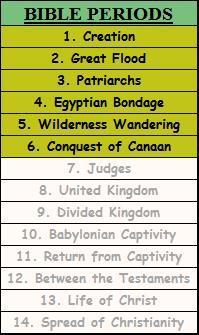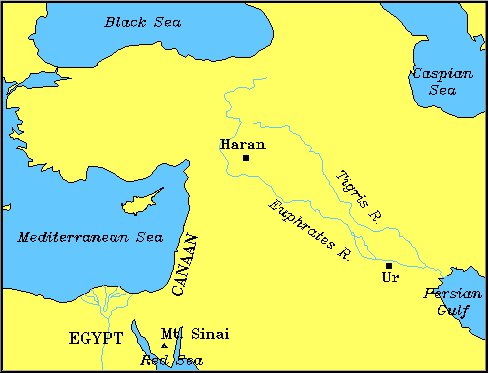
Lesson 2
A SURVEY OF BIBLE HISTORY (Part 1)
New International Version (NIV)
1. Creation
The Bible is firmly embedded in history. It begins by describing the creation and traces the subsequent activities of selected individuals and groups of people until the close of the first century A.D. God revealed His will for humankind through His interaction with these people. The Bible is the record of that interaction.
The Bible begins with this summary of the creation (Gen. 1:1): In the beginning God created the heavens and the earth. The remaining verses of Gen. 1-2 provide details. God took six days to prepare the earth for creating and sustaining life. On the sixth day, God created man. The entire human race has descended from Adam and Eve, the first man and woman. Gen. 3 tells how Adam and Eve committed the first sin and how God punished them because of it..
2. The Great Flood
As the number of people increased during early human history, sin also increased--so much so that a few generations after Adam and Eve, the spiritual condition of mankind was thoroughly corrupt: The Lord saw how great the wickedness of the human race had become on the earth, and that every inclination of the thoughts of the human heart was only evil all the time. (Gen. 6:5).
The world was so wicked God decided to destroy the human race and start over again, preserving only those who were righteous. Only Noah and his family, eight in all, believed God was planning to send a great flood to destroy the human race. Their faith was well founded. The flood came. Because he had built a large boat (the ark) as God had commanded, Noah was able to save his family and enough of the animal kingdom to insure that life would continue when the flood waters receded.
3. The Patriarchs
The Bible does not reveal much about the history of the world for several generations after the time of Noah. The next person after Noah to whom the Bible gives considerable attention was Abram, later called Abraham (Gen. 11:27 - 25:10). Although less than two chapters separate the Bible accounts of these two men, Abraham lived several hundred years after the flood.
Abraham was born near the northern end of the Persian Gulf in the city of Ur--a city located on the banks of the Euphrates River (see map, below). When he was more than 70 years old, God told him to leave Ur and travel to a land God would show him (Acts 7:2-3). Abraham and his family obeyed God and moved 600 miles upstream to the city of Haran. They stayed in Haran until Abraham's father, Terah, died. Abraham then took the rest of his family to the land God promised to show him, the land of Canaan, located near the southeastern coast of the Mediterranean Sea (see map). (In the Bible this sea is variously called "the Great Sea", "the western sea", "the sea of the Philistines", or simply "the sea").

Abraham's wife, Sarah, bore him a son named Isaac (Gen. 21:1-7), and Isaac had two sons named Esau and Jacob (Gen. 25:19-26). In Bible history Jacob is much more important than Esau. Jacob had twelve sons and a daughter (Gen. 29:31 - 30:21; 35:16-20). Abraham, Isaac, Jacob, and Jacob's twelve sons are called the Patriarchs (Heb. 7:4; Acts 7:8-9). God gave Jacob the name "Israel" (Gen. 32:28). Thereafter, the Bible most frequently calls his descendants the children (or sons) of Israel or Israelites.
Jacob's eleventh son, Joseph, was sold into Egyptian slavery by his older brothers when he was 17 years old (Gen. 37). They did it because they despised him--first, because he was his father's favorite son, and also because he told them about his dreams that suggested he would one day be their ruler.
An unusual chain of events led Joseph from being a slave boy in the household of Potiphar, the Egyptian officer who purchased him, to becoming the second most powerful man in the kingdom of Egypt (Gen. 39:1 - 41:45). From his initial slavery he became overseer of Potiphar's estate. When Potiphar's wife falsely accused him of trying to rape her, he was put in prison. While in prison, Joseph demonstrated to two fellow-inmates that God had given him the ability to interpret dreams. Later, Pharaoh learned about him, and when he was able to interpret two of the king's dreams, Pharaoh was so impressed that he promoted Joseph to the position of second in command in Egypt. All of this occurred by the time Joseph was 30 years old.
The Bible explains how God was behind the scenes, arranging matters so that Joseph would have the power and influence to save his family from a severe famine that came upon Canaan and Egypt (see map) seven years later. Joseph had the foresight and authority to accumulate vast stores of grain during the seven years preceding the onset of the famine so that the people would not starve to death when the time of critical shortage came (Gen. 41:46-49).
When the famine finally occurred, Jacob's family began to run out of food in Canaan. Jacob sent his sons to Egypt to buy grain. These events ultimately led Jacob to move his entire family to Egypt, where Joseph continued to serve directly under Pharaoh (Gen. 41:53 - 50:26).
4. Egyptian Bondage
One of the truisms of life is that conditions never stay the same. Eventually, a man became Pharaoh who was not on friendly terms with Joseph. Fearing the potential power of the growing number of Israelites, he forced them to become his slaves (Exo. 1:1-14). They remained his slaves for many years, groaning under their heavy burdens and pleading with God to deliver them (Exo. 3:7-8).
In another unusual series of events, Moses, a fourth-generation descendant of Jacob was born a slave but was brought up in the court of Pharaoh (Exo. 2:1-10). When he was 80 years old, God used him as the instrument through which the Egyptians were beset with ten devastating plagues (Exo. 3-12). After the tenth plague, Pharaoh agreed to free the Israelites from bondage (Exo. 12:31-33). The Israelites left Egypt 430 years to the day that the family of Jacob had arrived in Egypt from Canaan (Exo. 12:40-41).
5. Wilderness Wandering
Although they could have gone directly to Canaan when they left Egypt, God did not permit it. Instead, after a three-month journey,
they came to Mt. Sinai (see map), where they received the Ten Commandments and other sections of the Law of Moses (Exo. 13:20 - 23:33).

At Mt. Sinai, they made a covenant of obedience to God and officially became a nation (Exo. 24:1-8). Based on the size of their army, more than 600,000 men (Num. 1:45-46), the total population must have been between 2 and 3 million. At Mt. Sinai they also built a tabernacle (a special tent) to serve as the center of their worship of God (Exo. 25-30; 35-39).
After this seemingly auspicious start, the future of the new nation should have been hopeful and bright. But it was not. Already they had experienced the difficulties of living in the wilderness. In their time, even as it is today, the wilderness of the Sinai Peninsula was most inhospitable to humans. Their circumstances were so trying that they continually complained against Moses and God and quickly lost their faith that God could take care of them and see them safely through the hardships until they reached the land of Canaan (Exo. 14:10-12; 15:22-24; 16:1-3; Num. 11:1-3; 13-14; etc.).
Because they did not believe and obey God, He condemned them to live in the wilderness as nomads for forty years (Num. 14:26-35). Except for two men (Joshua and Caleb), every person above the age of 20 died during this period. So the first generation of Israelites to leave Egypt did not have the privilege of entering Canaan and fulfilling the promise to Abraham.
6. Conquest of Canaan
Joshua followed Moses as the leader of Israel (Deut. 34:9). His primary role was to serve as the military commander of the Israelites as they conquered the seven nations that inhabited the land of Canaan (Josh. 1-12) and to divide the conquered land among the twelve tribes of Israel (Josh. 13-22).
Over a period of years, the Israelites succeeded in gaining control of the land although there were pockets of Canaanite tribes who were not destroyed (Josh. 13:1-7). Because the Israelites did not completely eliminate these people, the heathenism of the Canaanites turned out to be a curse for the Israelites. The Canaanites worshipped idols and in the name of their religion participated in sensual and immoral practices. Later, these practices appealed to the Israelites, but during the time of Joshua and for a few years thereafter, the Israelites remained devoted to God (Josh 24:29-31).
If you have difficulties in exercising this lesson procedure, please send an E-mail message describing the difficulty to:
webmaster@jordanpark.org
Be sure to specify the following:
1. Lesson number,
2. Bible version,
3. Your browser name and version,
4. Your operating system.
5. Any error message(s)
Visit the Jordan Park Homepage
© 2020, 1998 JORDAN PARK CHURCH OF CHRIST
HUNTSVILLE, ALABAMA